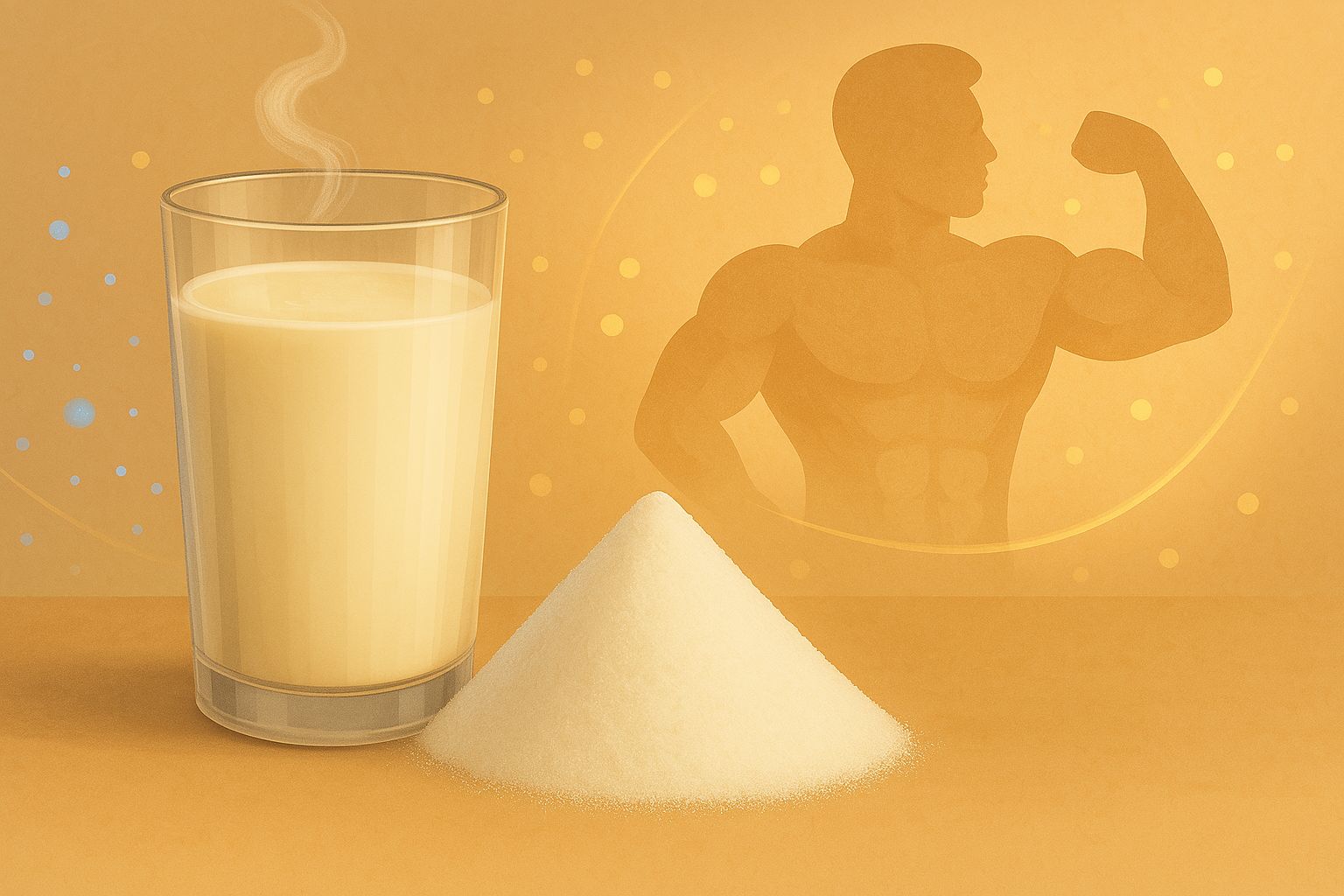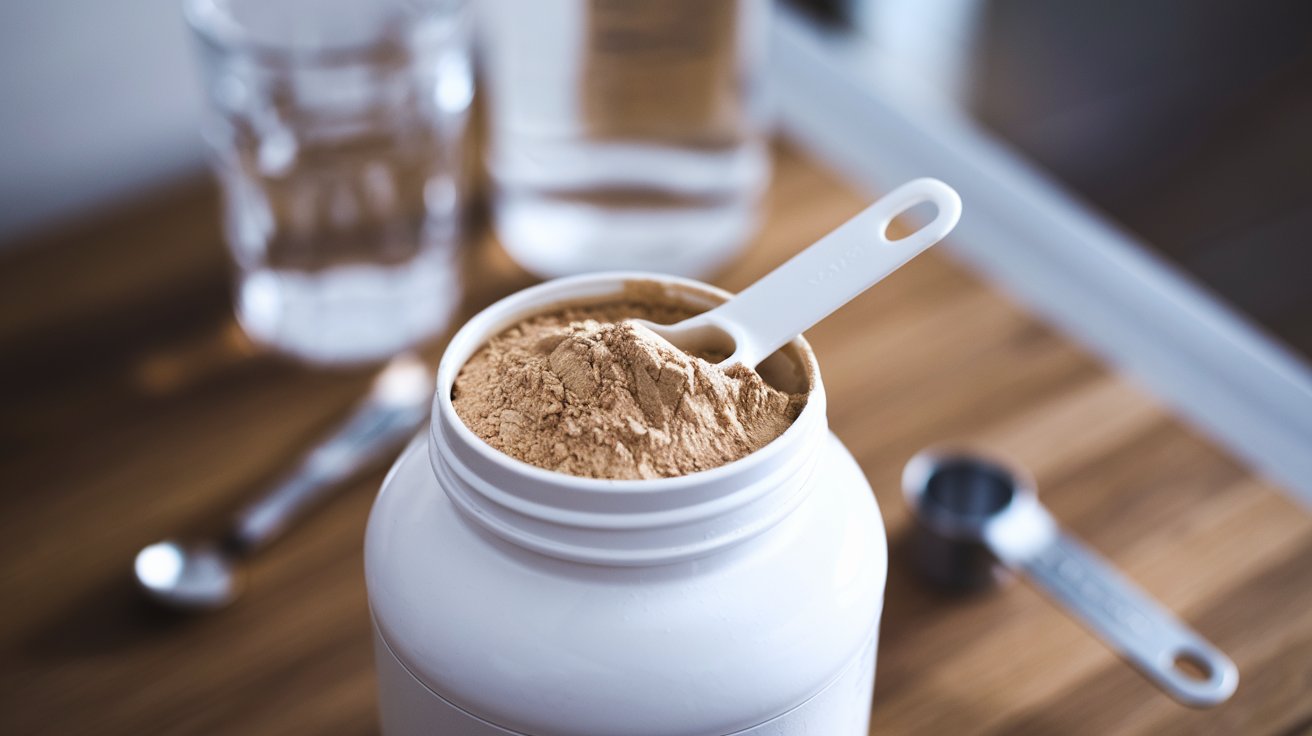What is casein protein?

Milk and milk products are a commonly consumed source of protein after training to increase muscle mass and speed up the rate of post-workout recovery. In addition to whey protein-based protein supplements, casein protein supplements have been available on the sports supplement market for many years. Let's find out what casein protein is, what properties it has and whether it is a good source of protein for physically active people.
- Casein protein - what is it?
- Casein protein - dietary sources
- Casein protein - effects
- Casein protein - when is it best to use?
- Casein protein - dosage
- Casein protein - contraindications.
Casein protein - what is it?
Casein protein is one of the two proteins that make up milk protein. The other is whey protein, which is well known to all strength training enthusiasts. Casein protein is the dominant protein in cow's milk, as its content is as high as 80%. Whey is only 20%. Casein protein occurs naturally in milk and milk products in the form of large colloidal particles called casein micelles. Casein is a protein with high biological value that requires a longer digestion time compared to whey protein. Casein protein clots, which are formed in the acidic environment of the stomach, slow down digestion and delivery of amino acids to the body. Casein protein also contains more amino acids, such as arginine, glutamic acid, proline, serine, tyrosine, histidine, methionine and phenylalanine, than whey protein. Casein can also be isolated from cow's milk to produce micellar casein-based protein supplements and milk replacers for young children. Today you can find products on the market that contain casein, calcium caseinate or casein hydrolysate.
Casein protein - dietary sources
Casein protein occurs naturally in cow's milk and its products. The richest dietary sources of casein protein include cottage cheese, country cheese, soft cheeses (including Brie, Camembert, Gorgonzola, Feta, Mozzarella, Ricotta), hard cheeses (e.g. Cheddar, Emmentaler, Gouda, Parmesan), yogurts, kefirs, buttermilk and acidophilic milk. Casein protein found in the form of various micelles can be divided into four main fractions, namely alphas1-casein (55%), beta-casein (25%), kappa-casein (15%) and gamma-casein (5%). Casein micelles form a clot in the stomach both under the influence of the acidic environment (low pH) and the presence of pepsin, an enzyme of gastric juice. Casein protein provides the human body with all the essential amino acids, which is why it is classified as a good quality protein source with high digestibility and bioavailability as assessed by indicators such as PDCAAS (corrected protein amino acid digestibility index) and DIAAS (digestible essential amino acid index).
Casein protein - effects
Casein protein can support the development of muscle mass and strength in anyone who regularly trains at the gym. Casein helps achieve similar effects on muscle mass growth to whey protein. Compared to whey protein, casein is a slower-digested protein source, the consumption of which results in a moderate but longer postprandial increase in plasma amino acid concentrations. Studies have shown that consuming at least 40 g of casein protein about half an hour before bedtime delivers a steady stream of amino acids to skeletal muscle throughout the night, thus significantly accelerating the rate of post-workout recovery and promoting the development of muscle mass and strength. Casein protein increases muscle protein synthesis and reduces muscle protein breakdown, as well as improving skeletal muscle function and alleviating delayed post-workout muscle soreness (known as DOMS), inflammation and exercise-induced muscle damage. Besides, casein protein increases the feeling of satiety and reduces appetite and delays the feeling of hunger. Casein protein also contains bioactive peptides (known as lactotripeptides), which can lower blood pressure.
Casein protein - when is it best to use?
Casein protein is the most recommended source of protein before bedtime for all people engaged in competitive and amateur sports, and especially in strength and bodybuilding disciplines. Casein consumed before bed increases the overnight availability of amino acids in the blood plasma, thus helping to achieve a positive protein balance and positively influencing post-workout regeneration and the development of strength and muscle mass. The use of a protein supplement based on micellar casein will be ideal especially for those people who regularly train at the gym, who have great difficulty in meeting the increased daily protein requirements during the period of muscle mass development or fat reduction. Casein protein is also a good idea for all those who aim to lose excessive fat mass and have a lot of trouble maintaining satiety between meals.
Casein protein - dosage
Studies have shown that consuming nearly 40 grams of casein protein half an hour before going to bed can be an excellent way to speed up the rate of skeletal muscle recovery after evening strength training. In addition, regular consumption of casein protein at a minimum of 40 g about 30 minutes before bedtime can significantly stimulate muscle protein synthesis (MPS) and lower the rate of its breakdown, as well as favorably affect protein metabolism in the body and physiological adaptation of skeletal muscles (i.e., development of strength and muscle mass). It is worth mentioning that frequent consumption of casein protein in the amount of 40-48 g about 30 minutes before bedtime has no negative effect on fatty acid oxidation and the process of lipolysis, i.e. the breakdown of adipose tissue.
Casein protein - contraindications.
Casein protein is contraindicated in all people with a known allergy to cow's milk protein. Scientific data show that sensitization to cow's milk protein allergens affects only 0.5% of the adult population. The most common clinical symptoms of cow's milk protein allergy reported by patients include diarrhea, abdominal pain, vomiting, skin rash, hives and atopic dermatitis. Products containing casein protein are also not indicated in the presence of chronic gastrointestinal conditions such as lactose intolerance, irritable bowel syndrome (IBS), small intestinal bacterial overgrowth syndrome (SIBO), Crohn's disease and ulcerative colitis (UC). This is due to the fact that milk and milk products (including protein supplements), which are a source of casein protein, also contain lactose (milk sugar), which can cause gastrointestinal and extraintestinal discomfort. In this case, lactose-free products that provide casein protein are recommended.
Sources:
-
Antonio J, Ellerbroek A, Peacock C, et al: Casein Protein Supplementation in Trained Men and Women: Morning versus Evening. Int J Exerc Sci. 2017 May 1;10(3):479-486.
-
Kerksick CM, Arent S, Schoenfeld BJ, et al: International society of sports nutrition position stand: nutrient timing. J Int Soc Sports Nutr. 2017 Aug 29;14:33.
-
Glab TK, Boratynski J.: Potential of Casein as a Carrier for Biologically Active Agents. Top Curr Chem (Cham). 2017 Aug;375(4):71.
-
Joy JM, Vogel RM, Shane Broughton K, et al: Daytime and nighttime casein supplements similarly increase muscle size and strength in response to resistance training earlier in the day: a preliminary investigation. J Int Soc Sports Nutr. 2018 May 15;15(1):24.
-
Trommelen J, Weijzen MEG, van Kranenburg J, et al: Casein Protein Processing Strongly Modulates Post-Prandial Plasma Amino Acid Responses In Vivo in Humans. Nutrients. 2020 Jul 31;12(8):2299.
-
Kim J.: Pre-sleep casein protein ingestion: a new paradigm in post-exercise recovery nutrition. Phys Act Nutr. 2020 Jun 30;24(2):6-10.
-
https://www.ais.gov.au/nutrition/supplements/group_a#isolated_protein_supplement
 ⮜ Previous article
⮜ Previous article
How does protein nutrition work and what are the types?
 Next article ⮞
Next article ⮞